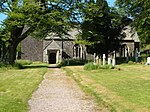Cornwood

Cornwood is a village and civil parish in the South Hams in Devon, England. The parish has a population of 988. The village is part of the electoral ward called Cornwood and Sparkwell. The ward population at the 2011 census was 2,321.Blachford House is a large grade II* listed country house standing in parkland on the northwest edge of the village. It is currently owned by Alexander Darwall, a multimillionaire hedge fund manager who became notorious for bringing about a ban on the long-practised custom of wild camping on Dartmoor, in response to which 3,000 protesters gathered in Cornwood to march onto nearby Stall Moor on 21 January 2023. Darwall’s actions earned him the epithet ‘the most hated landowner’. From 1852 to 1959 the village was served by Cornwood railway station on the South Devon Main Line between Exeter and Plymouth. The civil parish includes the villages and hamlets of Lutton, Yondertown, North Hele, South Hele, Corntown, Uppaton, Tor, East Rook and West Rook.
Excerpt from the Wikipedia article Cornwood (License: CC BY-SA 3.0, Authors, Images).Cornwood
Newtown, South Hams Cornwood
Geographical coordinates (GPS) Address Nearby Places Show on map
Geographical coordinates (GPS)
| Latitude | Longitude |
|---|---|
| N 50.419 ° | E -3.964 ° |
Address
Newtown
Newtown
PL21 9QL South Hams, Cornwood
England, United Kingdom
Open on Google Maps









